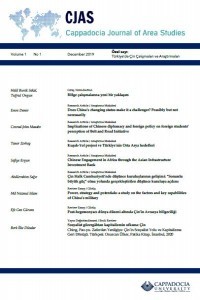Post-hegemonyacı dünya düzeni altında Çin’in Avrasya bölgeciliği
Avrasya, bölgecilik, Çin, hegemonya, Şangay İşbirliği Örgütü
China’s Eurasian regionalism in the post-hegemonic world order
Eurasia, regionalism, China, hegemony, Shanghai Cooperation Organization,
___
- Ahmed, Z. S., S. Ahmed ve S. Bhatnagar. 2019. “Conflict or Cooperation? India and Pakistan in Shanghai Cooperation Organisation” Pacific Focus, 34(1), 5-30.
- Akhtar, M., ul Ain, Q. ve A. Kiran. 2018. “Shanghai Cooperation Organization and Conflict Resolution” National Defense University Journal, 8(1), 89-97.
- Ambrosio, T. 2008. “Catching the 'Shanghai spirit': how the Shanghai Cooperation Organization Promotes Authoritarian Norms in Central Asia” Europe-Asia Studies, 60(8), 1321–1344.
- Aris, S. 2009. “The Shanghai Cooperation Organisation: 'Tackling the Three Evils'. A Regional Response to Non-traditional Security Challenges or an Anti-Western Bloc?” Europe-Asia Studies, 61(3), 457–482.
- Aris, S. 2011. Eurasian Regionalism - The Shanghai Cooperation. New York: Palgrave Macmillan.
- Bennett, A. 2010. “Process Tracing and Causal Inference” Brady, H.E. ve D. Collier (der.), Rethinking Social Inquiry, Plymouth: Rowman and Littlefield, 207–20.
- Bhagwati, J. 2004. In Defense of Globalization. Oxford: Oxford University Press.
- Briceño-Ruiz, J. ve A.R. Hoffmann. 2015. “Post-Hegemonic Regionalism, Unasur, and the Reconfiguration of Regional Cooperation in South America” Canadian Journal of Latin American and Caribbean Studies, 40(1), 48-62.
- Calabrese, L. 2019. “China and global development: what to read ahead of the Belt and Road Forum.” https://www.odi.org/blogs/10752-china-and-global-development-what-read-ahead-belt-and-road-forum
- Camdessus, M. 2017. “Why China’s belt and road must be a pathway to sustainable development.” https://www.scmp.com/comment/insight-opinion/article/2094611/why-chinas-belt-and-road-must-be-pathway-sustainable
- Carroll, W. K. 2010. The Making of a Transnational Capitalist Class. London: Zed Books.
- China Center for International Economic Exchanges. 2017. “The Belt and Road Initiative: A new means to transformative global governance towards sustainable development.” https://www.undp.org/content/dam/china/docs/Publications/UNDP-CH-GGR%202017.pdf
- China Daily. 2018. “Xi gives new impetus to Belt and Road Initiative.” http://www.chinadaily.com.cn/a/201808/28/WS5b84994fa310add14f388114.html
- Collier, D. 2011. “Understanding Process Tracing” Political Science and Politics, 44(4), 823–830.
- Dadabaev, T. 2014. “Shanghai Cooperation Organization SCO Regional Identity Formation from the Perspective of the Central Asia States” Journal of Contemporary China, 23(85), 102–118.
- Desai, R. 2013. Geopolitical Economy: After US Hegemony, Globalization and Empire. London: Pluto Press.
- Desai, S. 2019. “SCO 2019: hits and misses for India.” https://www.asiatimes.com/2019/06/opinion/sco-2019-hits-and-misses-for-india/
- Du Boff, R.B. 2003. “U.S. Hegemony: Continuing Decline, Enduring Danger” Monthly Review, 557, 1–15.
- George, A.L. ve A. Bennett. 2005. Case Studies and Theory Development in the Social Sciences. Cambridge: MIT Press.
- Gürcan, E. C. 2010. “New Regionalisms and Radical Identity Formation in Latin America” Journal of Social Research & Policy, 1(2), 19–33.
- Gürcan, E. C. 2015. “The nonprofit-corporate complex: An integral component and driving force of imperialism in the phase of monopoly-finance capitalism” Monthly Review, 66(11), 37–53.
- Gürcan, E. C. 2019a. “Geopolitical Economy of Post-Hegemonic Regionalism in Latin America and Eurasia” Research in Political Economy, 34(1), 102–118.
- Gürcan, E. C. 2019b. Multipolarization, South-South Cooperation and the Rise of Post-Hegemonic Governance. New York: Routledge.
- Gürcan, E. C. 2019c. “Political geography of Turkey’s intervention in Syria: underlying causes and consequences (2011-2016)” Journal of Aggression, Conflict and Peace Research, 11 (1), 1–10.
- Gürcan, E. C. 2019d. “BRICS Ülkelerinin Afrika'daki Yükselişine Jeopolitik Ekonomi Penceresinden Bir Bakış” Gümüşhane Üniversitesi Sosyal Bilimler Enstitüsü Dergisi, 10 (3), 556-569.
- Gürcan, E. C. 2019e. “Geopolitical Economy of Post-Hegemonic Regionalism in Latin America and Eurasia” Research in Political Economy, 34 (1), 59–88.
- Gürcan, E. C. ve O. Bakiner. 2015. “Beyond Neoliberal Hegemony in Latin America: Alianza Bolivariana para los Pueblos de Nuestra América (ALBA), Kreps, D. (der.), Gramsci and Foucault: A Reassessment, Farnham: Ashgate, 131–155.
- Hardt, M. ve A. Negri. 2005. Multitude: War and Democracy in the Age of Empire. New York: Penguin Books. Kembayev, Z. 2018. “Implementing the Silk Road Economic Belt: from the Shanghai Cooperation Organisation to the Silk Road Union?” Asia Europe Journal, 16(1), 37–50.
- National Development and Reform Commission. 2015. “Action Plan on the Belt and Road Initiative” http://english.www.gov.cn/archive/publications/2015/03/30/content_281475080249035.htm
- Riggirozzi, P. ve D. Tussie (Der.). 2012. The Rise of Post-hegemonic Regionalism: The Case of Latin America. New York: Springer
- Robinson, W.I. 2008. Latin America and Global Capitalism: A Critical Globalization Perspective. Baltimore: Johns Hopkins University Press.
- Robinson, W.I. 2014. Global Capitalism and the Crisis of Humanity. Cambridge: Cambridge University Press.
- SCO Business Council. 2016. Official Website. https://bc-sco.org/?lang=en.
- SCO Youth Council. 2016. Official Website. http://www.forumsco.com/?lng=en.
- Sklair, L. 2002. Globalization, Capitalism and Its Alternatives. Oxford: Oxford University Press.
- Slaughter, A. M. 2004. A New World Order. Princeton: Princeton University Press.
- Song, W. 2013. “Feeling Safe, Being Strong: China's Strategy of Soft Balancing through the Shanghai Cooperation Organization” International Politics, 50(5), 664–685.
- Song, W. 2014. “Interests, Power and China's Difficult Game in the Shanghai Cooperation Organization SCO” Journal of Contemporary China, 23(85), 85–101.
- Song, W. 2016. China's Approach to Central Asia: The Shanghai Co-operation Organisation. New York: Routledge.
- Stratfor. 2012. “Central Asia’s Looming Conflict Over Water, Part 1: The Upriver Countries. Assessments” http://www.stratfor.com/analysis/central-asias-looming-conflict-over-water-part-1-upriver-countries.
- The Guardian. 2019. “Macron criticised by US and Germany over Nato 'brain death' claims.” https://www.theguardian.com/world/2019/nov/07/macron-warns-of-nato-brain-death-as-us-turns-its-back-on-allies
- United Nations. 2016. “International Trade Statistics Database” https://comtrade.un.org/.
- USAID. 2016. “Foreign Aid Explorer” https://explorer.usaid.gov/.
- Vennesson, P. 2008. “Case Studies and Process Tracing: Theories and Practices” della Porta, D. ve M. Keating (der.), Approaches and Methodologies in the Social Sciences: A Pluralist Perspective, Cambridge: Cambridge University Press, 223–39.
- Wallace, T. 2014. “China and the Regional Counter-Terrorism Structure: An Organizational Analysis” Asian Security, 10(3), 199–220.
- Water Politics. 2014. “Conflicts in Kyrgyzstan: Foreshadowing Water Wars to Come?” Water Politics, http://www.waterpolitics.com/2014/06/17/conflicts-in-kyrgyzstan-foreshadowing-water-wars-to-come/
- Wolf, Martin. 2004. Why Globalization Works. New Haven: Yale University Press.
- Başlangıç: 2019
- Yayıncı: Kapadokya Üniversitesi
Bölge çalışmalarına yeni bir yaklaşım
Halil Burak SAKAL, Tuğrul KESKİN
Çin'in Asya Altyapı Yatırım Bankası aracılığıyla Afrika'ya katılımı
Çin dış politikasındaki dönüşümü anlamak: 1949’dan 2019’a tarihsel bir değerlendirme
Sosyalist güzergâhtan kapitalizmin ufkuna: Çin
Güç, strateji ve potansiyeller: Çin ordusunun temel yetenekleri ve unsurları üzerine bir inceleme
Post-hegemonyacı dünya düzeni altında Çin’in Avrasya bölgeciliği
